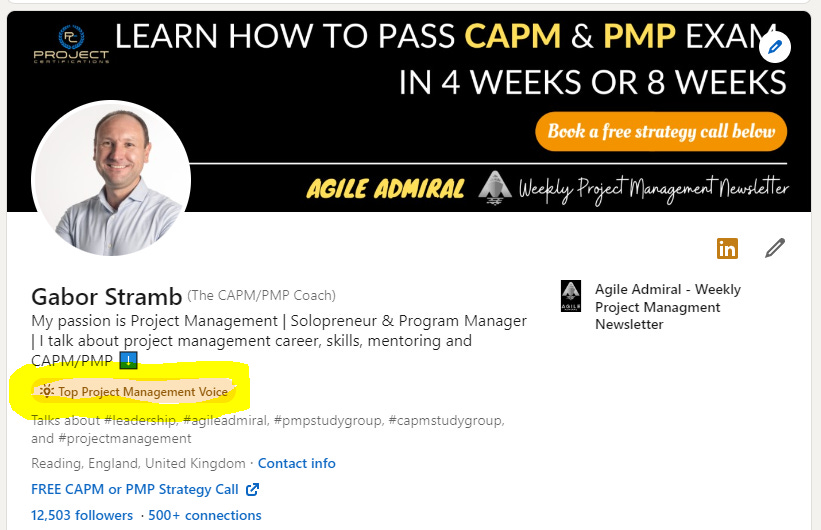Read time: 4 minutes
Agenda:
✍️ Quote of the Week
🔨 12 Project Manager Interview Questions
🏆 Top Project Management Voice
📆 Weekly FREE CAPM/PMP Study Group
✍️ Quote of the Week
"The false game is to give legitimacy to the notion that there is a hierarchy of importance among human beings.”
Plus
Building Your Bulletproof Motivation - Do Hard Work
Do Hard Work: There’s no substitute for this. Anyone who’s achieved outlier success in work or in life has had to work hard for it.
🔨 12 Project Manager Interview Questions
And best answers to ACE your interview
All project managers will go through interviews.
Even if you apply for an internal role or new opportunities(external).
Interviews are "functional", which means, either 💼 Scenario-Based, or 🚧 Behavioral-Based
💼 Scenario-Based
How PMs respond to hypothetical project management scenarios. This will test your thinking process: problem-solving skills, leadership style, knowledge of project management methods and tools, etc...
🚧 Behavioral-Based
The purpose of these questions is to get an idea of how the project manager has acted in the past. How PM applied project management skills and knowledge to solve real-life problems.
As per my research here are some of the questions which are going to be asked in an Interview:
🌪️ Have you managed remote teams?
🌪️ What was a challenging project, and how did you manage it?
🌪️ How do you manage team members that aren’t working to their full potential?
🌪️ What’s the biggest mistake you’ve made on a project?
🌪️ How do you seek help outside of the project team?
But here is the summary of the TOP 12 Project Manager Interview Questions in 2023:
Have you managed remote teams?
How to answer: Be honest and transparent. This is one of the most difficult questions to ensure. Please be prepared for how remote teams can be managed. Regular team meeting and once a week f2f.
Tell us about a time something went wrong in a project you were managing.
How to answer: Since dealing with unforeseen challenges is a core part of project management, you’ll want to have a few examples to point to for your interview. You can also mention how you would implement change processes in your project.
What was your most successful project?
How to answer: This question is not here to “flex” your capabilities. It is a trap! Instead of you trying to answer how you made this success, instead focus on the team perspective. Not “I” delivered success, instead, “Team” delivered success, with examples.
How do you know the project is off track?
How to answer: This is all about Risk management. How you identify, mitigate and avoid risks. Prepare a few examples, it is easier to provide answers.
How do you gain agreement with teams?
How to answer: Another trap! No “command & control”, focus on consensus and common ground. Reach team buy-in to make sure we can deliver.
How do you prioritise tasks in a project?
How to answer: Tie your answer back to the interest of the project. Your answer might include some combination of deadlines, stakeholder needs, or determining tasks that make up a critical path. You can pull from some examples in the past, or work your way through some hypothetical situations.
Do you delegate?
How to anwer: Micromanager ALERT! This is a bit of a trick question or at least one that has an implicit question embedded in it. What you really want to know is not whether they delegate, but how they delegate work to their team members. This is a great way to weed out the micromanagers.
What’s your experience with budget management?
How to answer: Managing a budget includes cost estimation, deciding how to allocate funds, keeping a record of how money was spent, and planning for unexpected expenses. It’s great if you can point to some examples in the past. If you don’t have much experience, you can share what you know about budget planning.
What’s your communication style?
How to answer: This is another classic interview question that directly asks about managing projects and leadership. A project manager is nothing if he has poor communication skills. They need to be able to speak to team members, stakeholders, vendors, etc. Each group needs a slightly different approach.
How would you deal with a difficult stakeholder?
How to answer: Communication and negotiation are likely to be an important part of your answer here. Knowing your team’s needs, capacity, and the project’s available resources might also influence your answer.
How do you work with customers, sponsors and stakeholders?
How to answer: This is all about your communication style. How to respond to different levels of the organization. Responding to executives, project sponsors and stakeholders requires a different approach than the one they’d use with teams and vendors.
What tools do you use to plan a project?
How to answer: In preparing for your interview, make a list of all the project management tools you’ve used before. These can include common project management tools like RACI charts, or collaboration software like Asana or Trello. Mention what you like about them, and how they might be improved.
🏆 Top Project Management Voice
I'm thrilled to announce that I've been recognized as a "Top Project Management Voice" by
Wow, this is HUGE :-)
Big thanks to You.
Big thanks to my connections for incredible support of my regular content and project management community.
Thank you.
📆 Weekly FREE CAPM/PMP Study Group
Each week I host TWO FREE session to ace CAPM/PMP Exams.
Next weeks weekly study group scheduled
Tuesday - Oct 10
PMP Study Group
Topic: What is the Agile Mindset
Link: https://www.linkedin.com/events/pmp-weeklystudygroup-topic-tbd7110535602525061121/
Wednesday - Oct 11
CAPM Study Group
Topic: ITTOs in the new exam
Link: https://www.linkedin.com/events/capm-weeklystudygroup-topic-tbd7110536097155137536/
Looking forward to see you on the session :-)
PS.:
Join the CAPM/PMP Study Group in LinkedIn:
CAPM: https://www.linkedin.com/groups/12881121/
PMP: https://www.linkedin.com/groups/12884882/
PS.: +++ FREE Study Plan








